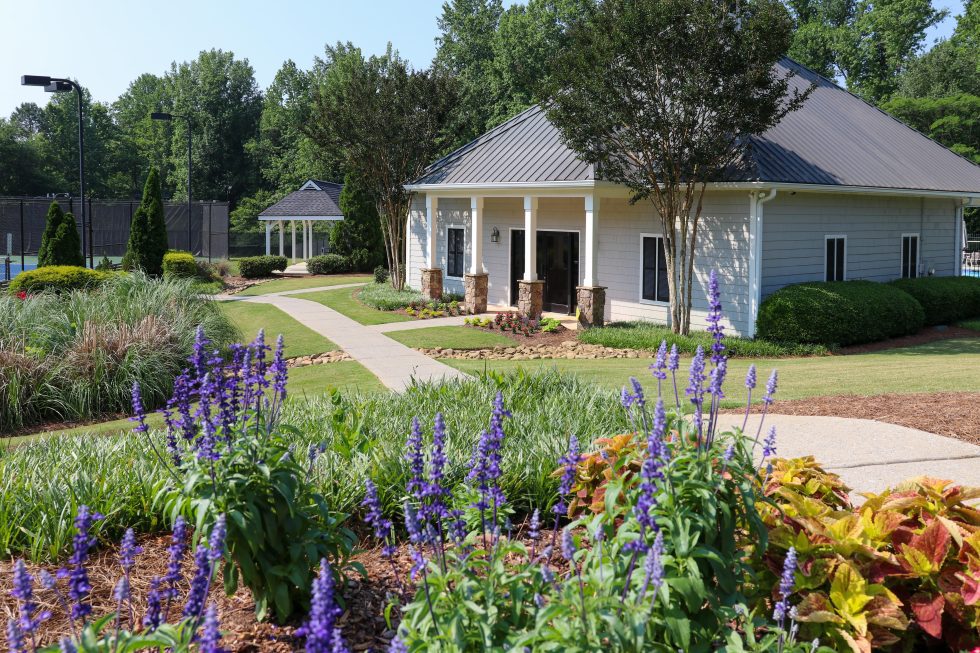A Guide To Commercial Landscaping Ground Covers


When it comes to commercial landscaping, ground covers are an essential aspect that should be considered. Whether it’s a corporate office, shopping center, or public park, the choice of ground cover can significantly impact the landscape’s overall aesthetic appeal and maintenance requirements.
A Guide To Commercial Landscaping Ground Covers
Commercial landscaping ground covers play a crucial role in enhancing the aesthetic appeal and functionality of outdoor spaces. They provide a low-maintenance solution for large areas, suppress weed growth, conserve moisture, and contribute to erosion control. This guide will introduce you to popular commercial landscaping ground covers commonly used in various settings.
Types Of Commercial Ground Covers
When looking at what commercial ground covers to use, there are a variety of options to choose from. It can be overwhelming to know what’s best for your property. Here are the most common types of commercial ground covers:
Mulch Or Pine Straw
Mulch is one of the most widely used ground covers in commercial landscaping. It can be made from various materials, including wood chips, bark, straw, or recycled rubber. Mulch helps retain soil moisture, suppresses weed growth, and protects plant roots from extreme temperatures. It also adds organic matter to the soil as it decomposes.
Gravel/Rock
Gravel and Rock are other popular options for commercial landscapes. They’re available in various sizes and colors, allowing customization to suit different designs. Both provide excellent drainage, which is beneficial in areas prone to excessive water accumulation. They can create paths, driveways, or decorative elements around plants and hardscape features.
Ground-Cover Plants
Using low-growing plants as ground covers is an environmentally friendly and a visually appealing option. They help prevent soil erosion, reduce weed growth, and add texture and color to the landscape. Some common ground cover plants include jasmine, liriope, mondo grass, creeping thyme, creeping juniper, vinca minor, and sedum. These plants are often chosen for their ability to tolerate foot traffic and thrive in various light conditions.
Turfgrass
Turfgrass, such as Bermuda grass or Kentucky bluegrass, can be an excellent choice for commercial landscapes that require a lush, green lawn. Turfgrass provides a comfortable surface for walking, playing, or other outdoor activities. However, it requires regular mowing, watering, and maintenance to keep it healthy and attractive.
Wood Chips Or Bark
Wood chips or bark are frequently used in commercial landscapes, particularly in natural areas, garden beds, or around trees and shrubs. They offer a decorative appearance, help retain soil moisture, and gradually decompose, adding organic matter to the soil. Wood chips also provide a natural pathway material and act as a weed barrier.
Best Practices For Implementing Commercial Ground Covers
By following these best practices for preparation, installation, maintenance, and design considerations, businesses can successfully implement commercial ground covers that enhance their outdoor spaces’ beauty, functionality, and longevity.
Preparation And Installation
Proper site and soil preparation are crucial before installing ground covers in commercial landscapes. Clear the area of debris, rocks, and existing weeds. Ensure the soil is well-drained and amend it if necessary to improve its fertility and structure. Different ground cover types may have specific soil requirements, so research and adjust accordingly.
Maintenance And Care
Proper maintenance is essential for commercial ground covers. Establish a regular watering schedule, considering the specific water needs of each ground cover type. Apply mulch to conserve moisture and control weeds. Fertilize ground cover plants.
Design and Aesthetics
Incorporate ground covers into the overall landscape design to create a cohesive and visually appealing commercial space. Consider the ground covers’ color, texture, and patterns to achieve the desired aesthetic effect. Choose ground covers that complement the surrounding plants, hardscape elements, and architectural features.
Benefits Of Commercial Ground Covers
Ground covers offer several benefits in commercial landscaping, making them a practical choice for various outdoor spaces. Here are some key benefits of using ground covers:
- Weed Suppression–Ground covers create a dense layer of foliage that shades the soil, inhibiting weed growth. This reduces the need for manual weeding or herbicides, saving time and effort in maintenance.
- Erosion Control–The sprawling growth habit of ground covers helps stabilize the soil, preventing erosion caused by wind or water runoff. Their extensive root systems bind the soil particles together, reducing the risk of soil erosion on slopes or areas with high foot traffic.
- Moisture Conservation–Ground covers act as natural mulch, reducing soil moisture evaporation and helping to retain water. They provide a protective barrier that shields the soil from direct sunlight, keeping it cool and moist for the benefit of nearby plants.
- Soil Health Improvement–As ground covers decompose, they contribute organic matter to the soil, improving its structure, fertility, and moisture-holding capacity. This enhances overall soil health and supports the growth of other plants in the landscape.
- Low-Maintenance–Many ground covers require minimal maintenance once established. They typically have slow growth rates, reducing the need for frequent mowing or trimming. This makes them a practical and time-saving option for commercial landscapes.
Discover Commercial Ground Covers With Landscape Workshop
By incorporating commercial ground covers, businesses can create attractive outdoor spaces that positively impact clients, customers, and employees. These well-designed and functional landscapes not only enhance the aesthetics but also contribute to a welcoming and enjoyable environment that aligns with the overall goals and image of the business. Contact Landscape Workshop to discuss the best ground covers for your commercial landscape.






















